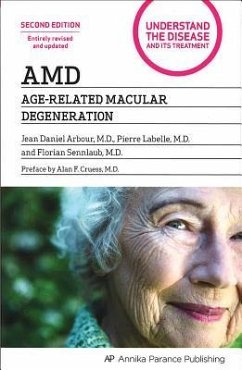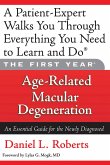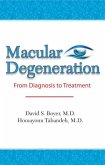Jean Daniel Arbour, Francine Behar-Cohen, Pierre Labelle, Florian Sennlaub
AMD - Age-Related Macular Degeneration
Second Edition
15,99 €
inkl. MwSt.
Versandfertig in über 4 Wochen

8 °P sammeln
Jean Daniel Arbour, Francine Behar-Cohen, Pierre Labelle, Florian Sennlaub
AMD - Age-Related Macular Degeneration
Second Edition
- Broschiertes Buch
- Merkliste
- Auf die Merkliste
- Bewerten Bewerten
- Teilen
- Produkt teilen
- Produkterinnerung
- Produkterinnerung
Understand the Disease and Its Treatment series. AMD affects one million Canadians, yet it is still poorly understood and causes much anxiety to those diagnosed with it: Will I go blind? Will I be able to lead a normal life? Can I be cured? This book addresses these and many other questions to help in understanding the impact of AMD in everyday life. In addition, the latest advances in AMD research are explained, as major therapeutic breakthroughs that have considerably improved the quality of life of people with AMD have been made in recent years and new treatments under development hold even more promise for the future.…mehr
Andere Kunden interessierten sich auch für
![Ancestral Dietary Strategy to Prevent and Treat Macular Degeneration Ancestral Dietary Strategy to Prevent and Treat Macular Degeneration]() Chris A KnobbeAncestral Dietary Strategy to Prevent and Treat Macular Degeneration26,99 €
Chris A KnobbeAncestral Dietary Strategy to Prevent and Treat Macular Degeneration26,99 €![Ancestral Dietary Strategy to Prevent and Treat Macular Degeneration Ancestral Dietary Strategy to Prevent and Treat Macular Degeneration]() Chris A KnobbeAncestral Dietary Strategy to Prevent and Treat Macular Degeneration64,99 €
Chris A KnobbeAncestral Dietary Strategy to Prevent and Treat Macular Degeneration64,99 €![The Age Related Macular Degeneration Mastery Bible The Age Related Macular Degeneration Mastery Bible]() Ankita KashyapThe Age Related Macular Degeneration Mastery Bible11,99 €
Ankita KashyapThe Age Related Macular Degeneration Mastery Bible11,99 €![I will lift up my eyes to the hills!: A personal experience of macular degeneration and miracles I will lift up my eyes to the hills!: A personal experience of macular degeneration and miracles]() Liz LentonI will lift up my eyes to the hills!: A personal experience of macular degeneration and miracles24,99 €
Liz LentonI will lift up my eyes to the hills!: A personal experience of macular degeneration and miracles24,99 €![Macular Degeneration Macular Degeneration]() Paul WallisMacular Degeneration18,99 €
Paul WallisMacular Degeneration18,99 €![The First Year: Age-Related Macular Degeneration The First Year: Age-Related Macular Degeneration]() Daniel L RobertsThe First Year: Age-Related Macular Degeneration19,99 €
Daniel L RobertsThe First Year: Age-Related Macular Degeneration19,99 €![Macular Degeneration: From Diagnosis to Treatment Macular Degeneration: From Diagnosis to Treatment]() David S. BoyerMacular Degeneration: From Diagnosis to Treatment17,99 €
David S. BoyerMacular Degeneration: From Diagnosis to Treatment17,99 €-
-
-
Understand the Disease and Its Treatment series. AMD affects one million Canadians, yet it is still poorly understood and causes much anxiety to those diagnosed with it: Will I go blind? Will I be able to lead a normal life? Can I be cured? This book addresses these and many other questions to help in understanding the impact of AMD in everyday life. In addition, the latest advances in AMD research are explained, as major therapeutic breakthroughs that have considerably improved the quality of life of people with AMD have been made in recent years and new treatments under development hold even more promise for the future.
Produktdetails
- Produktdetails
- Verlag: Annika Parance
- Seitenzahl: 120
- Erscheinungstermin: 6. Februar 2017
- Englisch
- Abmessung: 208mm x 135mm x 8mm
- Gewicht: 159g
- ISBN-13: 9782923830513
- ISBN-10: 2923830512
- Artikelnr.: 49101851
- Verlag: Annika Parance
- Seitenzahl: 120
- Erscheinungstermin: 6. Februar 2017
- Englisch
- Abmessung: 208mm x 135mm x 8mm
- Gewicht: 159g
- ISBN-13: 9782923830513
- ISBN-10: 2923830512
- Artikelnr.: 49101851
Dr. Jean Daniel Arbour heads the ophthalmology department of the faculty of medicine at the University of Montreal, where he is also associate professor. After receiving his M.D. from the University of Montreal, Dr. Arbour interned in general surgery, specialized in ophthalmology and then went to Harvard University in the United States for medical and surgical retina training. At Harvard, Dr. Arbour also conducted research on macular degeneration and photodynamic and antiangiogenic therapy. Dr. Arbour is currently vitreoretinal surgeon at Notre-Dame Hospital, which is part of the University of Montreal hospital centre (CHUM). He is also the founder of the hospital's ophthalmology research centre, where he has been the principal investigator in genetic studies of wet AMD and numerous international studies of new treatments in macular degeneration and diabetic retinopathy. The author of many articles published in medical journals, Dr. Arbour has also given more than 70 national and international scientific conferences on retinal disease. Dr. Arbour was president of the Quebec association of ophthalmologists from 2005 to 2009. He is currently treasurer of the Canadian Ophthalmological Society. Dr. Francine Behar-Cohen has served as professor and staff ophthalmologist at the Hôtel-Dieu de Paris since 2006. A retinologist, she is currently setting up a clinical research unit. Dr. Behar-Cohen received her M.D. and a Ph.D. in cellular biology from the Paris-Descartes University and did her internship in Paris hospitals and her residency in vitreoretinal surgery at the Hôtel-Dieu de Paris. In 2001, Dr. Behar-Cohen headed an Avenir team at France's national institute of health and medical research (INSERM, ) and in 2003 she founded INSERM Unit 598, dedicated to the physiopathology of eye diseases and therapeutic innovations. In 2008, this unit became the Cordelier Research Center, located in Paris. Dr. Behar-Cohen has been researching ocular drug delivery systems and pharmacology for more than ten years. She is also investigating intraocular inflammation and the role of inflammation in retinal pathologies previously considered non-inflammatory - including ADM and diabetic retinopathy. She is the author of more than 110 publications and about a dozen books or book chapters. Dr. Pierre Labelle is an ophthalmologist at Maisonneuve-Rosemont Hospital and full clinical professor in the department of ophthalmology of the faculty of medicine at the University of Montreal. After receiving his M.D. and his diploma in ophthalmology, Dr. Labelle completed a research fellowship in retinal diseases and surgery at Washington University in St. Louis in the United States. He earned the first medal awarded by the Canadian Ophthalmological Society for his work on the prevention of sports-related eye injuries and was awarded the Securitas prize by the Regie de la securite dans les sports du Quebec, Quebec's sports safety board, for his public awareness work. Dr. Labelle is president of the Association des medecins ophtalmologistes du Quebec, Quebec's association of ophthalmologists, and heads the ophthalmology departments of Maisonneuve-Rosemont Hospital and the faculty of medicine of the University of Montreal. Under his direction, the Centre Michel-Mathieu was established at Maisonneuve-Rosemont Hospital in 1999, an internationally renowned institute of excellence in ophthalmology. Given his interest in clinical research, Dr. Labelle has collaborated on many research projects, including projects investigating macular degeneration. Dr. Florian Sennlaub heads a research team at France's national institute of health and medical research (INSERM) in Paris. Born in Germany, Dr. Sennlaub studied medicine in Germany, Scotland and France. He received his M.D. from the University of Humboldt in Berlin and a Ph.D. from Rene-Descartes University in Paris before devoting himself fulltime to research in ophthalmology. He worked for three years at the research centre at Sainte-Justine Hospital in Montreal before putting together his own team to explore the mechanisms of ocular degeneration and neovascularization at the Cordelier Research Center in Paris. Dr. Sennlaub regularly publishes articles in journals specializing in biomedical research. His research is supported by French and European agencies.







